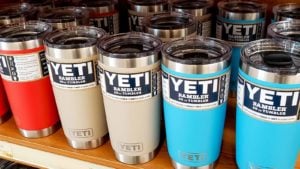If you’re looking for stocks to buy to double your money in 2020, you might want to look beyond the S&P 500.
Don’t get me wrong. The S&P 500’s total return of 28.9% in 2019 was one of the best performances the index has seen in decades.
However, a quick screen shows that only a few S&P 500 stocks doubled over the past year. But, if you broaden the search to include all U.S.-listed stocks with market caps exceeding $2 billion, the number of stocks doubling in value in 2019 jumps dramatically to over 70.
Broken down by sector, healthcare and technology stocks had the best results in 2019 — with 29 and 38 doubling over the past year, respectively. The remaining seven sectors had between three and eight stocks double in 2019.
Of the more than 70 stocks that doubled year to date, here are seven stocks to buy as of Jan. 2 that I believe will deliver a repeat performance in 2020.
Stocks to Buy: Shopify (SHOP)

Shopify (NYSE:SHOP), what I consider to be one of Canada’s best tech stocks, gained 187% in 2019.
As the e-commerce platform’s stock went higher in 2019, the number of stories that appeared recommending shorting SHOP stock increased dramatically. Currently, Shopify has 4.72 million shares short, which is a lot until you consider that it only takes two days to cover based on its average daily volume — making a short squeeze very difficult to pull off.
As I stated in November, as long as Shopify’s monthly recurring revenue (MRR) continues to grow by double-digit percentages, it will continue to deserving of a growth-company valuation. MRR grew by 41.4% and 33.8% over the past two years.
More importantly, it took Shopify 19 months to go from 600,000 subscribers to 1 million subscribers. At 25% compound annual growth, Shopify ought to hit 2 million subscribers by the end of 2022.
Another reason to like Shopify’s chances of doubling for a second-consecutive year is that CEO Tobias Lutke doesn’t believe in spending all day and night at work.
“I’m home at 5:30 pm every evening. My job is incredible, but it’s also just a job. Family and personal health rank higher in my priority list,” Lutke tweeted recently.
Roku (ROKU)

If you bought Roku (NASDAQ:ROKU) at the end of 2018, you’re sitting pretty early in 2020. The stock rose 337% throughout 2019.
While it’s doubtful that ROKU stock will deliver a repeat performance in 2020, I think the odds are high that it will generate 100%-plus returns over the next year. I believe it will continue to grow its international business while also improving its advertising platform.
In my eyes, Roku was a “Stock of the Year” candidate in 2019 because it continued to grow the number of active accounts and streaming hours from those accounts. In the third quarter, Roku increased the average hours streamed per account by 22% to 318.9.
As long as it continues to remain a relatively neutral aggregator of TV shows and movies through the Roku platform and Roku Channel, I don’t see anyone taking market share from the company.
I would suggest that given Roku’s volatility, you put aside some cash to buy some more ROKU stock when it experiences a correction in the next year. In September 2019, ROKU lost around 40% of its value in less than a month.
StoneCo (STNE)

When I think of the name StoneCo (NASDAQ:STNE), for some reason, I think of a paper business. Perhaps it’s that whole rock, paper, scissors thing.
Anyway, StoneCo isn’t a paper company, but a Brazilian payment processing stock that’s 4.3% owned by Warren Buffett and Berkshire Hathaway (NYSE:BRK.A, NYSE:BRK.B).
How’s that for an endorsement?
In 2019, StoneCo’s stock gained 116% thanks to double-digit growth in both revenues and profits. In Q3 2019, revenues and adjusted net income increased by 62% and 126% year-over-year, respectively.
The company operates in Brazil, where the economy and currency are on the mend. And, digital payments through debit and credit transactions account for just 40% of all transactions in the country — suggesting that StoneCo’s growth trajectory is very healthy.
In addition to processing payments, just like Square Capital does, StoneCo loans money to small- and mid-sized customers. In the third quarter, outstanding loans increased by 333% to 13,000.
I continue to favor disruptive companies. Especially in emerging markets such as Brazil, where the penetration is so much lower than in North America and Europe.
Universal Display (OLED)

You can’t keep a good stock down.
In November 2018, I recommended investors buy Universal Display (NASDAQ:OLED) stock on the dip. OLED had lost almost 42% of its value through the first 10 months of 2018. Since then, it’s up 97%, with all of the gains coming in 2019.
In 2013, I recommended buying Universal Display as one of five stocks to buy for the next 20 years. My rationale was simple: OLED stands for organic light-emitting diode. It had more than 3,000 patents related to display technologies for flat-panel TVs, smartphones, etc. It licenses its technology to manufacturers of these products.
At the time, digital displays were transitioning from LED to OLED; Universal Display was the industry leader. Therefore, it was a no-brainer. As companies such as Apple (NASDAQ:AAPL) moved to make their own displays, investors started to get nervous about growth.
However, if the company’s latest quarterly report is any indication, OLED’s got plenty of gas left in the tank in 2020 and beyond.
Generac Holdings (GNRC)

In 2019, Generac Holdings (NYSE:GNC) delivered a total return of 102%, with almost one-third of the gains coming in the final three months of the year.
The tail end of Hurricane Dorian hit Halifax, Nova Scotia, where I live, in September — knocking out power for most of the province. Ever since then, I’ve paid close attention to Generac’s TV advertisements promoting its residential generators.
Although you could hardly mistake Generac for Roku or Shopify, it still managed to deliver record-breaking net sales and adjusted EBITDA in the third quarter. Residential sales jumped 7.4% on higher demand for the company’s residential units.
As North America’s electrical grid ages, the number of power outages increases. Clearly, I’m not the only person noticing Generac’s products on TV. And, as a result, Generac’s raised its sales growth for the entire fiscal year.
Generac doesn’t pay a dividend. However, if its residential unit in the U.S. continues to grow in the high single digits, there will be more than enough capital appreciation to keep shareholders happy.
Yeti Holdings (YETI)

Yeti Holdings (NYSE:YETI) is your typical rags to riches entrepreneurial story.
Brothers Roy and Ryan Seiders founded the company in 2006 in Austin, Texas. The two outdoorsmen were frustrated with the quality of hard coolers on the market. By utilizing advanced manufacturing techniques and forward-thinking design, the duo came up with the Yeti cooler, an indestructible product that put other coolers to shame. From there, the brothers moved on to other outdoor products, and the rest, as they say, is history.
In 2012, the brothers agreed to sell 70% of the company to New York City-based private equity firm, Cortec, for $67 million. When Yeti went public in October 2018 at $18 per share, some stories circulated at the time that suggested Cortec could reap as much as $3.3 billion from the IPO.
I’ve looked all through its IPO documents and fail to see that much largesse.
Nonetheless, all of the stakeholders, including the Seiders brothers, have benefitted greatly over the past seven years. And those that bought in IPO shares and are still holding gained 134% in 2019 alone.
In October, I recommended YETI stock because the company’s direct-to-consumer business is growing by leaps and bounds.
Private equity firms often are bad news for consumer brands. In the case of Cortec, that wasn’t the case. In 2020, expect Yeti to maintain its growth trajectory.
Cannae Holdings (CNNE)

Cannae Holdings (NYSE:CNNE) generated a 2019 return of 117%.
Who is Cannae Holdings?
It is the not-so-new name for Fidelity National Financial Ventures, the non-real estate investment vehicle of Fidelity National Financial (NYSE:FNF) — one of the biggest providers of title insurance in the U.S.
What does Cannae own today?
Its most significant investment is in Ceridian HCM Holdings (NYSE:CDAY), a human capital management company run by Canadian CEO David Ossip. I first recommended CDAY stock in May 2018, calling it “one of the best up-an-coming stocks to own on the NYSE.”
CDAY is up 105% in the 20 months since. Cannae recently sold 9 million shares at nearly $57 each. It still owns 28.7 million shares or 20% of the company.
In February 2019, in conjunction with other investors, Cannae acquired Dun & Bradstreet for $6.5 billion, including the assumption of $1.1 billion in debt. In the take-private acquisition, Cannae invested $506 million in return for 24.5% of D&B’s outstanding equity.
In addition to these two extensive holdings, it also has a few smaller investments — including a controlling stake in the O’Charley’s, Village Inn and Ninety Nine Restaurants & Pubs.
Chairman Bill Foley II is known to be one of the better capital allocators in America.
At the time of this writing Will Ashworth did not hold a position in any of the aforementioned securities.
